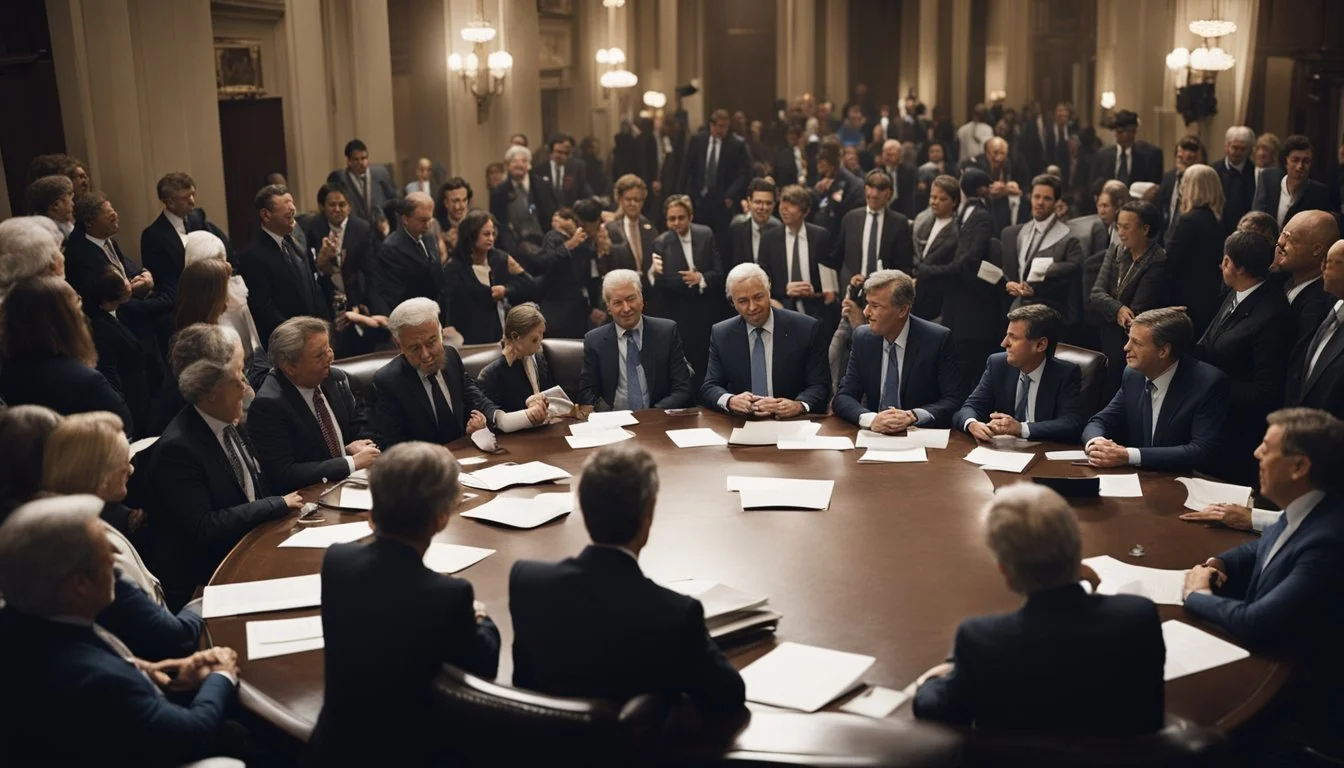5 Documentaries on Political Lobbying
Unveiling the Influence of Power
Political lobbying plays an influential role in shaping the policies that affect everyday life. It's a complex process involving various stakeholders who use their resources to sway lawmakers and government officials. Understanding the mechanisms and impacts of lobbying can provide valuable insight into the political landscape and the power dynamics at play.
Documentaries on political lobbying offer a unique window into this often opaque world. By combining storytelling with factual analysis, these films illuminate the strategies and consequences of lobbying activities, offering viewers a clearer picture of how political influence is wielded behind the scenes.
1) The Lobby (2017)
"The Lobby" is a series of documentaries produced by Al Jazeera. The series investigates the influence of the Israel lobby in the United States and the United Kingdom. Through undercover footage and interviews, it reveals the strategies and efforts of pro-Israel advocacy groups.
The series gained attention for its detailed portrayal of lobbying activities. The first episode, in particular, scrutinizes how lobbyists attempt to shape political discourse and policy.
The documentary stirred controversy upon its release. Figures from the pro-Israel lobby vehemently criticized it, asserting that it unfairly targeted their activities. Despite this, it is praised by some for shedding light on the inner workings of political lobbying.
For more detailed information, visit Wikipedia.
2) The Corporate Coup D'État (2018)
"The Corporate Coup D'État" is an investigative documentary directed by Fred Peabody.
It examines how corporations and billionaires have gained significant control over the American political system. Through a combination of expert analyses and personal testimonials, the film sheds light on the economic and social impacts of this shift.
The film includes insights from political thinkers like John Ralston Saul and journalists such as Chris Hedges. Their perspectives help illustrate the dynamic between corporate power and political influence.
In addition to expert commentary, the documentary gives a voice to citizens from economically affected areas. These individuals share their experiences of job loss and community decline.
By featuring stories from regions like the Rust Belt, where industrial closures have devastated local economies, the film provides a grounded look at the consequences of corporate political dominance.
"The Corporate Coup D'État" offers a stark exploration of the intersection between business and politics. It highlights the importance of addressing these issues for the future of democracy.
For more information, you can visit the IMDb page.
3) Fed Up! (2014)
"Fed Up!" is a documentary directed, written, and produced by Stephanie Soechtig. It investigates the root causes of obesity in the United States.
The film argues that high amounts of sugar in processed foods are a significant yet often overlooked factor contributing to the obesity crisis.
It highlights the lobbying power of the sugar industry, referred to as "Big Sugar," and its role in preventing policy changes that could address rising obesity rates.
"Fed Up!" reveals how, for over 30 years, government dietary guidelines have failed to recognize the harmful impacts of sugar consumption.
This has resulted in widespread misconceptions about what constitutes a healthy diet.
By uncovering industry influences and misinformation, the documentary aims to challenge established beliefs about nutrition and health.
For more information on "Fed Up!" visit Wikipedia.
4) Gerrymandering
Gerrymandering (2010)
Gerrymandering, directed by Jeff Reichert, is a documentary film that tackles the intricate issues of redistricting in the United States. The film explores how political lines are drawn to influence electoral outcomes, raising ethical and moral concerns. It delves into the historical context and the ramifications for racial and political equity in American democracy. Wikipedia
Slay the Dragon (2020)
Slay the Dragon examines the insidious effects of gerrymandering on American politics. The documentary highlights Project REDMAP, a strategic initiative by the Republican Party to use redistricting as a means to secure power. The film connects the dots of how this practice impacts policy and voter representation in key states. NPR
Advocates for Democracy: Barak Goodman and Chris Durrance
Barak Goodman and Chris Durrance also address the issue of gerrymandering in their work. Their documentary focuses on the consequences of political manipulation of district boundaries and its effect on voter disenfranchisement. It provides a comprehensive look at how partisan interests can undermine democratic fairness and transparency. Wikipedia
These documentaries provide critical insights into the far-reaching impact of gerrymandering, from altering political outcomes to affecting voter equity on a national scale.
5) The Influence Machine
"The Influence Machine" (2016) illuminates the intricate world of political lobbying and its significant impact on American democracy. This documentary digs deep into how billions of dollars are spent annually by corporations to influence policymakers and secure favorable legislation.
Through interviews with key lobbyists, politicians, and business leaders, the film reveals the complex relationships and often opaque methods that dominate Washington's political landscape.
It also explores how lobbying has grown into a powerful industry, shaping decisions that affect every aspect of public life, from healthcare to environmental regulations.
The documentary not only examines the mechanisms of lobbying but also scrutinizes the ethical and democratic implications of this practice.
For further reading, see the Wikipedia page.
The Role of Political Lobbying
Political lobbying plays a fundamental role in shaping policy and decision-making processes in governments. It involves various actors and techniques to influence legislation and policy outcomes.
Definition and Importance
Political lobbying refers to the act of attempting to influence decisions made by officials in the government, typically legislators or members of regulatory agencies. It is protected by the First Amendment in the United States and provides a platform for various groups, ranging from big businesses to non-profit organizations, to voice their concerns and interests.
Lobbying is crucial because it ensures that diverse interests are represented in the political process. This can lead to more balanced and well-informed legislative outcomes. Moreover, effective lobbying can contribute to the creation of legislation that supports economic growth, societal well-being, and technological advancement.
Historical Context
Lobbying has a long history in American politics, tracing its roots back to the early days of the republic. Political scientist Thomas R. Dye highlighted that politics involves a battle over government resources, and lobbying has always been about influencing how these scarce resources are allocated.
In recent decades, the landscape of lobbying has evolved significantly. For instance, the amount spent on lobbying has dramatically increased, with $3.47 billion spent in the United States in 2019 alone. This growth reflects the increasing complexity of government regulations and the importance that various stakeholders place on legislative outcomes.
Lobbying Techniques and Strategies
Lobbyists employ a wide range of techniques and strategies to influence policymakers. Direct lobbying involves meeting with legislators and their staff to discuss specific issues and propose favorable legislation. Grassroots lobbying, on the other hand, aims to mobilize public opinion and encourage constituents to contact their representatives.
Other common strategies include coalition building, where multiple organizations band together to amplify their influence, and information campaigns that provide policymakers with data and reports supporting their position. Additionally, financial contributions to political campaigns are a well-known method used to gain access and potentially sway decisions.
By understanding and utilizing these techniques effectively, lobbyists can significantly impact the political landscape and the development of public policies.
Influence of Lobbying on Legislation
Lobbying significantly impacts legislative outcomes, shaping the direction of policies. This occurs through various strategies employed by lobbyists and the resulting public attitudes.
Case Studies
One notable example is the increase in lobbying expenditure by corporations. According to research, corporations spend about $2.6 billion annually on reported lobbying expenditures, further influencing legislation in favor of their interests. This large financial commitment often results in policy outcomes that benefit these corporations, sometimes at the expense of broader public interests.
Another case involves special interest groups who lobby for specific legislative changes. For example, healthcare lobbying has seen significant activity, with substantial investments from pharmaceutical companies aimed at influencing drug pricing laws. These efforts have led to mixed results, sometimes achieving favorable legislative changes and other times facing public and political resistance.
Public Perception
Public perception of lobbying is generally negative, with many seeing it as a distortion of democratic principles. The idea of "buying" influence creates a distrust in the legislative process. Research indicates that people often believe lobbying leads to policy changes that do not necessarily reflect the will of the majority.
Despite this, some advocate for positive lobbying, where nonprofits and progressive entities use lobbying to push for social and environmental reforms. This form of lobbying aims to align policy outcomes with the broader public good, though it still faces skepticism due to the overall negative perception of the practice.
Both case studies and public perception illustrate how lobbying molds legislation, whether through substantial financial investments or the shaping of public and political opinion. Such dynamics underscore the complex role of lobbying in modern democratic processes.
Ethical Considerations in Lobbying
Ethical lobbying involves transparency, accountability, regulation, and reform to ensure that it aligns with public interests and democratic values. Addressing these concerns is essential for maintaining integrity in the political process.
Transparency and Accountability
Transparency in lobbying means openly disclosing the entities backing lobbying efforts and the goals they hope to achieve. This ensures that the public and decision-makers are aware of who is attempting to influence policy and for what purpose.
Accountability involves holding lobbyists and their clients responsible for unethical actions. Regulatory bodies often require lobbyists to register and report their activities. These reports should include the issues they are lobbying for, the officials they are contacting, and the expenditures involved.
Such measures help prevent undue influence and corruption, making the lobbying process more trustworthy and fair.
Regulation and Reform
Regulation of lobbying seeks to establish guidelines and limitations on how lobbying activities are conducted. This is crucial in preventing conflicts of interest and ensuring that lobbying efforts are conducted ethically.
Laws and policies often set boundaries on gifts and contributions from lobbyists to politicians to minimize undue influence. Reform efforts focus on updating these regulations to address new challenges, such as digital lobbying and the increasing complexity of political influences.
Effective reform ensures that lobbying continues to serve public interests while adapting to changing political landscapes and technologies.





